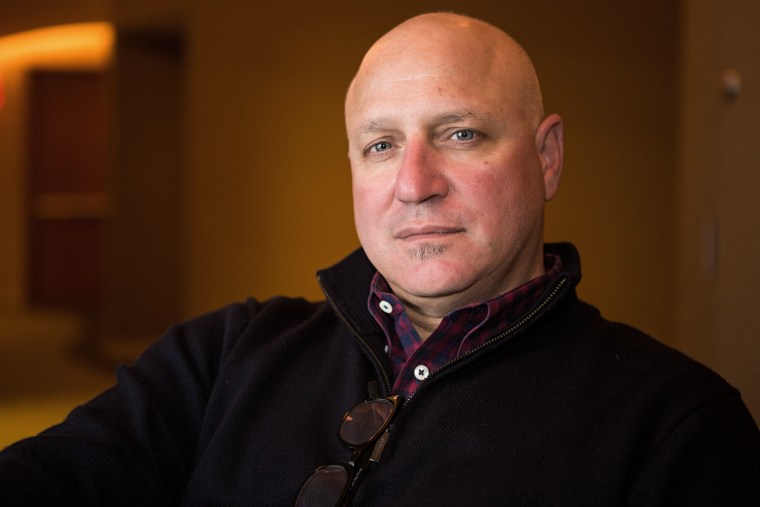Best known for being a withering judge on "Top Chef"and a successful restaurateur, Tom Colicchio has long been interested in the other side of the food equation: fighting hunger in America.
That’s where the new documentary "A Place at the Table" comes in. Executive produced by Colicchio and co-directed by his wife, Lori Silverbush, the gut-wrenching film chronicles a small sampling of the millions of Americans who are unsure where their next meal is coming from. It also offers solutions for how we can fix the problem by 2015.
“Hunger is right here in the United States,” says Barbie Izquierdo, one of the profiled characters in the film, a single mother of two from Philadelphia. “It could be right next door and you wouldn’t know it because people are too afraid to talk about it.”
NBC News talked with Colicchio about the film, about his own connection to hunger in America and how we can solve the problem of food insecurity.
NBC News: Why make this film now? What do you hope to accomplish?
Colicchio: Working on various hunger issues over the past 25 years, you get to a point where even with all the money in the world and working with great organizations is not fixing the problem. So at some point you need to look at the systemic reason why people are food insecure. And at home, my wife and I were mentoring a young girl and we realized the things that we were doing – she was often hungry and her family was often hungry, so we’d give her food and send it home – was really just putting a band-aid on it. It’s not a way to fix it. It’s a way to reduce the suffering and get by, but it doesn’t fix the problem.
My wife is a filmmaker and we said maybe it was time to do a film. Very early after she started her research we discovered that in 1968 there was an hour-long news piece that changed hunger in this country. That increased pressure on government and created more news stories, and very quickly people were fed up and shocked by it, which led to change. Through this process, most people that we talk to are simply shocked when they hear the numbers about food insecurity. People think it’s a smaller number, but they don’t understand how bad it is. So I think our hope is that through this we get a groundswell going and affect change.
NBC News: Why do you think this particular film can help lead that change?
Colicchio: I think if enough people see this film and understand the problem, it can happen. You have to understand the issue to fix it. And it’s not a film with talking heads giving you a bunch of numbers. It’s three people and three different unique narratives. You see their faces and you see police officers, teachers, a pastor and all these other people affected by food insecurity. And maybe you don’t know them, but you probably know people like them. And you make a connection. And once you make that connection, you say to yourself, “I have to help.” It’s incredibly hard to see a kid who is hungry and who is ashamed of being hungry. And if enough people want to fix it, government will get the message.
NBC News: What did you learn from working on this film?
Colicchio: For 25 years, I’ve been raising money and going to workshops to try and correct this issue, and I thought that was enough and I was doing my part. But from working on this film, I realized it’s not enough, because it’s not going to fix the problem of hunger. So it’s more about being an activist and an advocate now to give the people a voice that just don’t have a voice. Fifty million Americans don’t have a voice and can’t speak for themselves. We need to turn this into a voting issue, a single voting issue, and that’s where I hope this takes us.
NBC News: Many people think having a job is a guarantee against going hungry, but that’s not always the case. Can you talk about that a bit?
Colicchio: People don’t want to be in poverty and not be able to feed their kids. But because of the economy, there are plenty of people who were solid middle-class who are now on assistance. They want to work, it’s just not happening or happening fast enough. What we didn’t cover in the film are things like senior hunger or hunger in the military. Again, this issue is much bigger than many people realize, and hopefully this film raises awareness to fix it.
NBC News: On television and with all of your restaurants, you are a celebrity chef. How do you balance that role versus now being a food politician and advocate?
Colicchio: Television is television. I’m extremely proud of the fact that a few seasons ago on "Top Chef" we talked about school lunch and did a program on school lunch. But what it’s done for me is give me a platform, and this is how I choose to use my platform. That’s the real bonus. People who are in the limelight can do what they choose, and I want to use it for positive change. We were so lucky that Jeff Bridges came out for this film, too. We didn’t even reach out to him. He found out we were doing a film, called and said, “I need to be in it.” I think that there are plenty of examples of people doing it for positive reasons.
